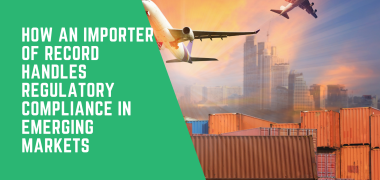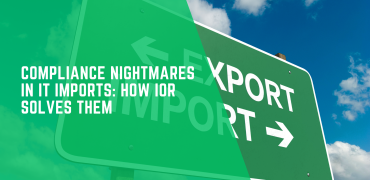Navigating regulatory compliance in emerging markets can be daunting for businesses expanding their international footprint. These regions often have complex, evolving legal frameworks that vary significantly from one country to another. One of the most efficient ways to manage this complexity is by partnering with an Importer of Record (IOR). An IOR ensures adherence to all relevant import laws and regulations while allowing companies to focus on their core operations. This article delves into how an IOR helps businesses manage compliance in emerging markets and the benefits of such a partnership.
Understanding the Role of an Importer of Record (IOR)
An Importer of Record is a third-party entity or organization legally responsible for ensuring goods comply with the local import regulations of a destination country. The IOR takes on the role of the official importer, assuming accountability for:
- Customs Documentation: Filing accurate and timely customs paperwork to prevent delays or legal complications.
- Tax and Duty Payments: Managing import taxes, duties, and other fees required by local authorities.
- Regulatory Adherence: Ensuring the goods meet all licensing, certification, and quality standards set by the importing country.
- Liability Management: Bearing legal liability for non-compliance with import regulations.
By acting as the importer on record, the IOR simplifies complex regulatory requirements, particularly in emerging markets.
Challenges of Regulatory Compliance in Emerging Markets
Emerging markets often present unique challenges for regulatory compliance. These include:
1. Fragmented Regulations
Laws and regulations governing imports can differ dramatically across regions within the same country. A lack of centralized enforcement further complicates compliance efforts.
2. Frequent Legal Changes
Many emerging markets are in the process of regulatory modernization. Frequent updates to laws and standards can be difficult for foreign businesses to track and adapt to in real-time.
3. Bureaucratic Inefficiencies
Inefficient administrative processes, inconsistent enforcement, and corruption may slow down compliance efforts. Delays in customs clearance can disrupt supply chains and increase costs.
4. Cultural and Language Barriers
Local customs, languages, and business practices can make it difficult for foreign companies to navigate regulatory landscapes effectively. Misunderstandings can lead to costly compliance errors.
5. Unique Product Standards
Some countries impose unique import requirements or product standards not found in international regulations, necessitating specialized knowledge to ensure adherence.
How an IOR Addresses These Challenges
An experienced IOR can navigate these challenges effectively, ensuring a smooth import process while minimizing risks. Here are some key ways an IOR manages regulatory compliance in emerging markets:
1. In-depth Knowledge of Local Regulations
An IOR stays updated on the latest changes in trade laws and customs regulations. This local expertise is invaluable for ensuring goods meet all legal requirements without delay.
2. Customs Clearance Expertise
IORs have established relationships with customs authorities and understand the procedural nuances of customs clearance. This expertise significantly reduces the risk of documentation errors or misclassification of goods.
3. Comprehensive Licensing and Certification
In many countries, specific goods require special permits or certifications for importation. An IOR facilitates the acquisition of these permits, ensuring the importer’s compliance with local rules.
4. Managing Duties, Taxes, and Fees
The IOR calculates and pays the correct amount of taxes and duties, ensuring accurate financial transactions and avoiding penalties or overpayment.
5. Liability Mitigation
An IOR assumes the legal responsibility for non-compliance, shielding the importer from fines, penalties, and potential damage to their reputation.
Benefits of Using an IOR in Emerging Markets
Partnering with an IOR offers several benefits for businesses entering or operating in emerging markets. These include:
1. Operational Efficiency
An IOR takes on the complexities of compliance, freeing up time and resources for companies to focus on strategic priorities like growth and customer engagement.
2. Risk Reduction
IORs’ expertise in local regulations significantly reduces the risk of compliance errors, customs delays, or penalties.
3. Cost Savings
While engaging an IOR involves service fees, the cost is often outweighed by the savings from avoiding fines, penalties, and supply chain disruptions.
4. Scalability
For companies expanding into multiple emerging markets, an IOR provides a scalable solution to handle the differing regulatory requirements of each country.
5. Enhanced Brand Reputation
Consistently adhering to regulatory requirements enhances a company’s reputation among local authorities and consumers.
Selecting the Right IOR Partner
Choosing the right IOR partner is crucial for success in emerging markets. Consider these factors when evaluating potential IORs:
1. Experience and Expertise
Look for IORs with a proven track record in your target markets and industries. Their expertise should align with your business’s specific needs.
2. Comprehensive Services
Ensure the IOR offers end-to-end services, from document preparation to customs clearance and tax management.
3. Technology Integration
Modern IORs leverage technology to provide real-time tracking, automated documentation, and seamless communication.
4. Reputation and References
Review the IOR’s reputation in the market by checking references, testimonials, and case studies from past clients.
5. Compliance with International Standards
Ensure your IOR partner adheres to international compliance frameworks, such as ISO certifications or trade best practices.
Real-World Example: Navigating Compliance in Africa
Africa is one of the most prominent emerging markets, offering significant growth opportunities for businesses. However, its diverse regulatory environment poses challenges. For instance:
- Country-Specific Rules: Nigeria requires specific certificates, such as the SONCAP (Standards Organisation of Nigeria Conformity Assessment Programme), for certain imports.
- High Tariff Variability: Import duties and taxes vary widely across countries and product categories.
- Infrastructure Constraints: Delays at ports due to inadequate infrastructure can disrupt operations.
By leveraging an IOR familiar with African markets, companies can ensure timely clearance, proper documentation, and adherence to regional requirements.
Conclusion
For businesses expanding into emerging markets, navigating regulatory compliance is both a challenge and an opportunity. The complexity of local laws, combined with bureaucratic inefficiencies, demands expert guidance to avoid costly missteps. An Importer of Record serves as a trusted partner, ensuring seamless compliance, minimizing risks, and enabling companies to focus on growth.
Whether you’re entering a single emerging market or expanding globally, collaborating with an IOR provides a strategic advantage. With the right IOR partner, your business can achieve efficient operations, cost savings, and enhanced market reputation in even the most complex regulatory environments.




